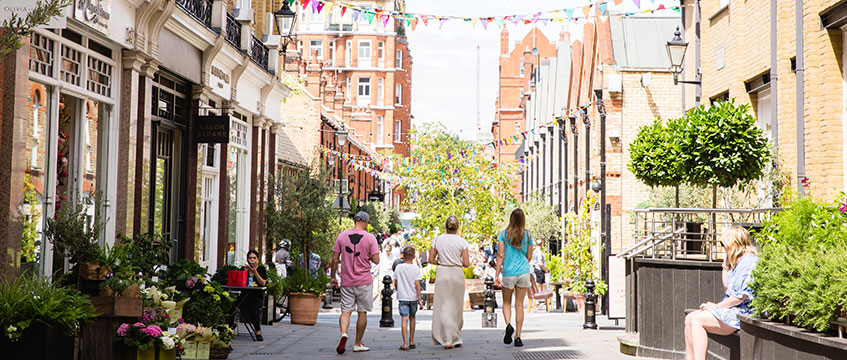Hugh Seaborn, chief executive of Cadogan, which owns large parts of Chelsea and Kensington, has warned that rent collection is significantly down on pre-Covid-19 levels and that the support it is offering occupiers is costing it “a lot of money”.
Speaking to EG, Seaborn also outlined concerns about further “bumps in the road” if there is a second wave of the coronavirus, as well as Brexit and the economy’s ability to withstand both in its weakened position.
Cadogan has provided more than £15m of financial support to over 250 retail and leisure companies.
Retail accounts for 49.9% of the family estate’s 93 acres in Kensington and Chelsea by value. Seaborn has been spending most of his time in discussions with some 300 tenants, as they battle to stay afloat during the pandemic.
Concessions have included deferring March quarter rents for some, agreeing monthly payments, and rent relief for more than 30 hospitality sector occupiers by switching these to turnover-based leases until mid-2021.
In addition, rental support has been extended to smaller independent retailers on a case-by-case basis and to cultural attractions, hotels, gyms, beauty and wellness establishments and medical premises.
The estate has also worked extensively with Kensington and Chelsea London Borough Council to support restaurant trading through al fresco dining.
Outside of this, Seaborn has placed the onus on local authorities to manage the reduction in retail on the UK’s high streets by preserving core areas, while allowing the periphery to fall away to other uses such as residential.
Seaborn said: “Covid-19 has accelerated the structural changes of retail, which means we need fewer shops sooner… There’s going to be an erosion of high streets, and the key thing there is how that’s managed.
“If we have a pepper-potting on the high street, the whole street is going to deteriorate.”
However, Seaborn hopes that the pain being experienced in the retail and hospitality sector might pave the way for more independent operators, which will provide “more differentiation and more local character” on high streets.
Seaborn is anticipating more CVAs and administrations to hit the industry once government support disappears.
However, he is determined to look beyond the crisis, and is pressing ahead with plans to revamp 196-222 King’s Road. Once complete, the scheme will comprise 180,000 sq ft of space across a Curzon cinema, Waitrose supermarket, rooftop hospitality space, flagship shops and housing.
The estate has also seen retailers Zadig & Voltaire and Ermanno Scervino launch their new flagship stores in July and has agreed lease renewal deals with Cucinelli, Loro Piana and Bulgari during lockdown, providing the business with confidence for the future.
For 2019, Cadogan has reported 3.8% growth in retail income to £89.9m compared with the previous year, representing 53.8% of its total rent roll.
The retail element of Cadogan’s portfolio posted a 12.6% net asset value fall to £2.8bn last year, despite 32 new leasing deals. This is likely to decline further this year.
Cadogan’s residential portfolio, which makes up 29.1% of the portfolio by value, also saw a net asset value decline of 10.7% to £1.62bn. The firm said the prime central London housing market was significantly impacted by political uncertainty ahead of the 2019 general election.
Even so, gross rents for the market-let portfolio rose by 2.1% to £33.1m due to acquisitions and rent reviews.
Looking ahead, Seaborn said he expects the performance of the residential portfolio to be flat for 2020.
The 500,000 sq ft of office space across the estate, meanwhile, saw an increase in its net asset value of 2.7% to £744m. The portfolio was fully occupied throughout 2019 and rental income from this part of the portfolio rose by 12.7% to £33.5m, representing 20% of the total rent roll.
Overall, Cadogan reported a fall of 9.4% (£581.4m) in the value of its portfolio to £5.57bn, offsetting total income growth of 9.7% to £185.9m in 2019. Operating profit before capital items increased from £98.1m to £105.8m.
The landlord upped its borrowings by 7.9% to £790.m during the year, while gearing increased to 17.1%, from 13.8%.
Cadogan upped its revolving credit facilities by £60m to £300m in April, for a minimum duration of three years, with one-year extension options.
To send feedback, e-mail louise.dransfield@egi.co.uk or tweet @DransfieldL or @estatesgazette











